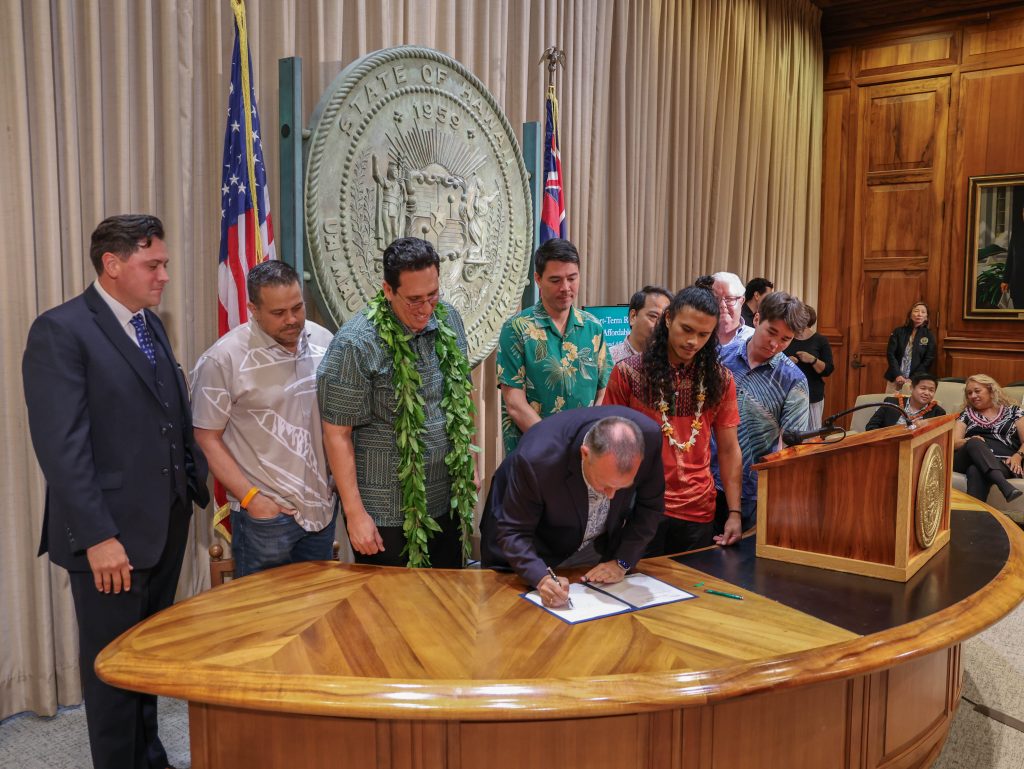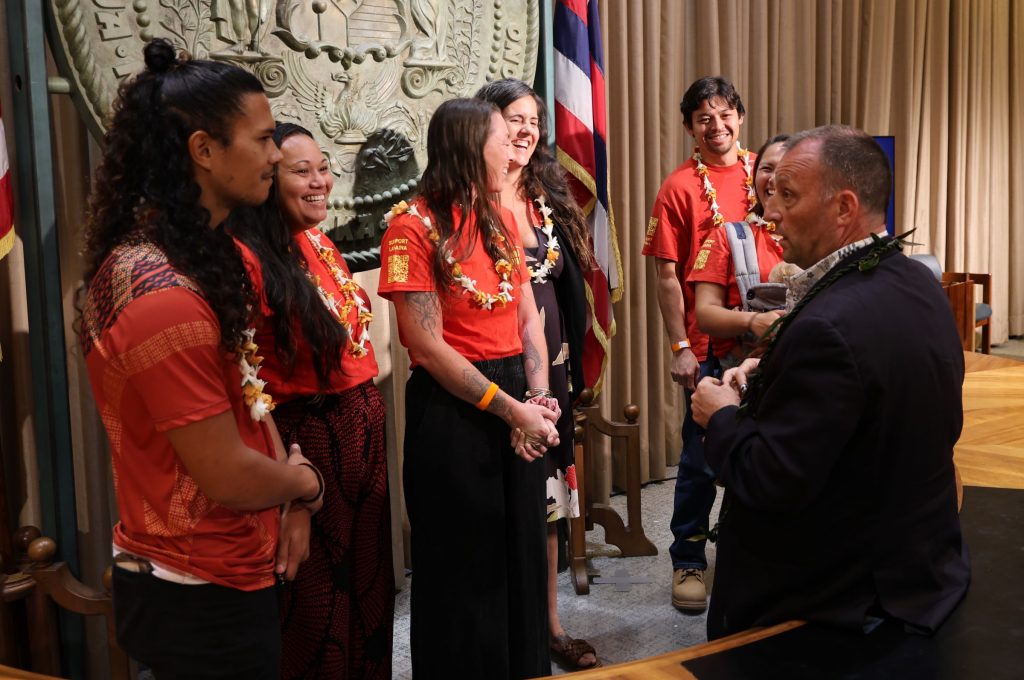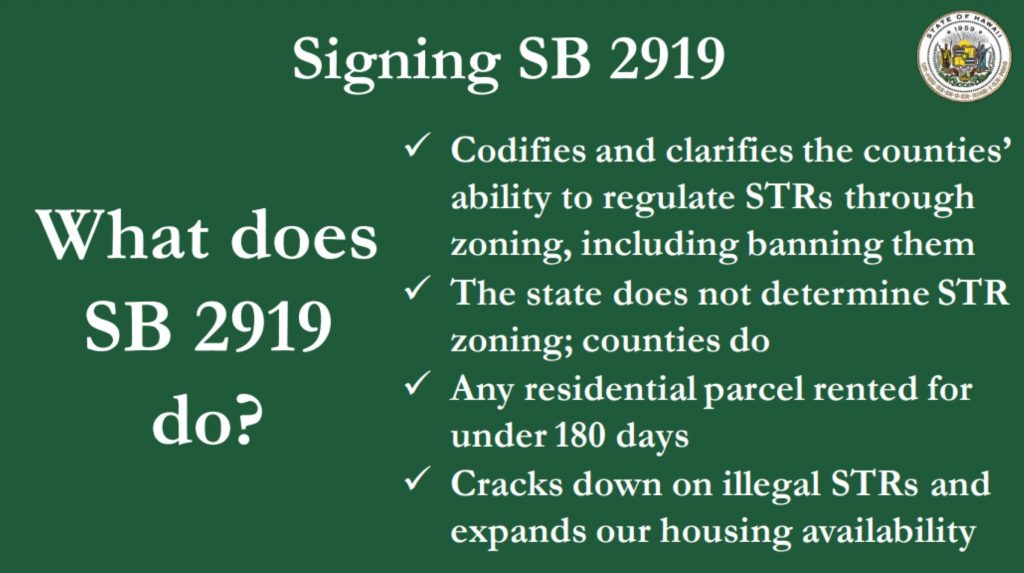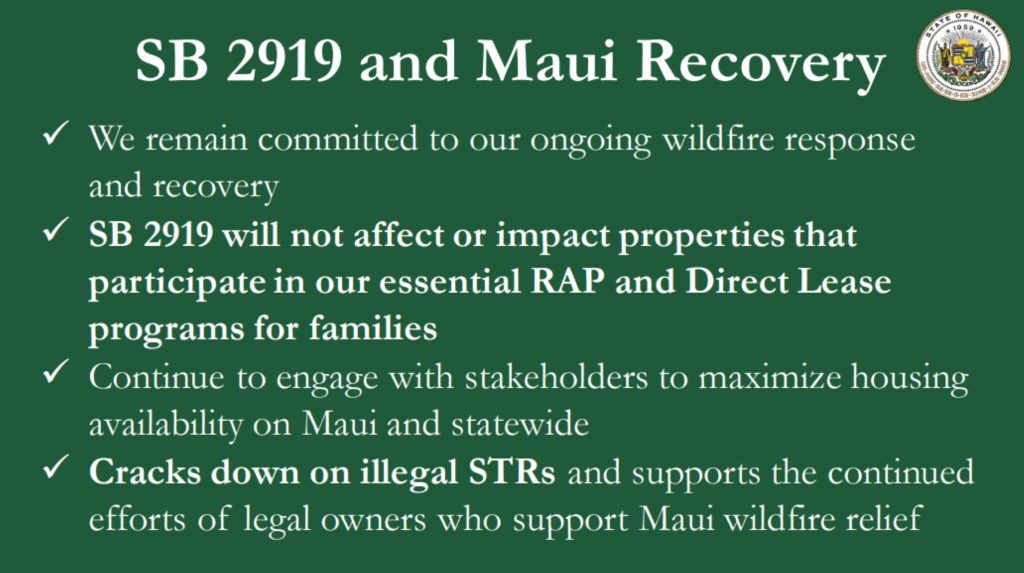New Hawai‘i law aimed at tackling illegal short-term rentals, provides counties with home rule authority
Gov. Josh Green touts it as a pivotal tool to tackle Hawai‘i’s housing crisis. Opponents say it doesn’t even address the real causes of the housing shortage.
No matter which side you’re on, it’s significant for the state’s short-term rental industry.

Green on Friday signed Senate Bill 2919 into law. The bill is aimed at ensuring the state’s four counties can guide their future development according to their long-term general plans while addressing the issue of illegal short-term rentals.
SB 2919 clarifies the counties’ zoning authority to regulate the time, place, manner and duration that land and structures can be used, particularly transient accommodations which include short-term rentals.
The measure also allows counties to phase out transient accommodations in areas zoned residential or agricultural.
A package of transient accommodation bills was already making its way through the legislative process in Hawai‘i County before Green signed SB 2919.
Transient accommodations are those provided for 180 days or less.
The bill expands the definition of a transient accommodation by adding certain shelters and vehicles with sleeping accommodations. Furthermore, it broadens the scope of the state’s transient accommodations tax law.
According to the governor’s office, the measure provides counties with home rule authority so vacation rentals are not allowed in communities that do not want them and helps clear up issues of state preemption.
Green said the bill will also assist against adverse impacts of non-resident ownership of short-term rentals, which impedes housing supply for Hawai‘i residents and emphasizes the unique needs of each of the state’s county to regulate such accommodations.
“As we press forward with our ongoing wildfire response and recovery efforts, SB 2919 will be a pivotal tool to address Hawai‘i’s housing crisis while ensuring our essential housing programs for Maui recovery remain robust,” said the governor. “Our commitment to maximizing housing on Maui and statewide persists, and the state continues to extend support to legal owners who contribute to Maui wildfire relief efforts.”
Information provided by the governor’s office says there are 75,000 illegal short-term rentals operating throughout the state. By taking on illegal short-term rentals, SB 2919 aims to alleviate the state’s housing crisis and increase housing levels throughout the islands.
The governor’s data reports 25% of the state’s residents struggle to cover the cost of housing expenses. Hawai‘i, with an average home price of $832,000, also faces a shortage of 50,000 housing units.
During Friday’s signing ceremony for SB 2919, the governor said the state is on track to build more than 13,000 housing units by 2026 and more than 60,000 units are in the pipeline now as part of 235-plus projects.

Hawai‘i REALTORS, a professional real estate trade organization with more than 11,000 active members throughout the state, strongly supports increasing affordable housing but says SB 2919 does not address the true causes of the housing shortage.
Those include onerous regulations, excessive red tape and high building costs.
The organization is also alarmed by a last-minute change to the bill that states short-term rentals are not residential use.
“A federal court already determined that they are unequivocally a residential use,” said the organization in a statement Friday after SB 2919’s signing. “Due to this change, someone who rents a room in their home to a student for a semester could lose their home’s residential classification.”
Hawai‘i REALTORS is extremely disappointed that the measure passed and was signed into law, especially at a time when the state’s families and workers need short-term rentals.
The organization does not support illegal vacation rentals but said SB 2919 does not give counties greater powers to address them and adversely impacts those who operate legal short-term rentals within the bounds of their respective county laws.
“The potential economic consequences of SB 2919 include the loss of state tax revenue and local jobs,” the Hawai‘i REALTORS statement said. “It will prevent local homeowners from offering rentals to offset their mortgage payments and make ends meet.”
It also worries that access to rental housing could be severely curtailed by granting counties the power to regulate and potentially ban rentals of 30 to 180 days, including month-to-month rentals that many residents use after their original lease expires, as well as any traditional 6-month rentals.
The concerns expressed by Hawai‘i REALTORS about SB 2919 are also among issues expressed by those on the Big Island opposed to the proposed new transient accommodations regulations in Hawai‘i County.
The three bills were introduced by Hawai‘i County Council Chairwoman Heather Kimball and Puna Councilwoman Ashley Kieriewicz. They are aimed at ensuring all of the island’s short-term rentals operate safely, legally and under the same standards.
The proposed legislation also seeks to preserve the character of the county’s residential and agricultural areas while reducing speculative property investment in those markets. It’s also hoped the changes would take off some of the inflationary pressure short-term rentals have on long-term rental rates.
Kierkiewicz said in January that short-term rentals do contribute to the island’s economy, but the county is at an inflection point to do something and address the myriad challenges community members have raised about them.
“What we’re just trying to do is safeguard our community interests and safeguard our future,” she said.
Kimball added that the legislation is meant to find a balance between the benefits to the island’s economy from transient accommodations and making sure their impacts are minimized.

“It’s an industry-wide alarm bell,” testified Nick Benoit during a January meeting of the council’s Policy Committee Planning, Land Use and Development. “Property management companies across the board and homeowners engaged in short-term renting face the stark prospect of scaling down or going as far as ceasing operations entirely.”
Benoit was representing Elite Pacific Vacations and was one of more than 100 people who spoke in person or submitted written testimony in opposition to the transient accommodations bill package, many especially about Bill 121, which does most of the heavy lifting.
“These stringent conditions could deter the operations of legitimate short-term rentals, which play a crucial role in our local economy by providing jobs and supporting tourism,” he said.
The bills were most recently reviewed by the Hawai‘i County Windward Planning Commission, which gave each of them unfavorable recommendations during its May 2 meeting.
Several commission members consider the measures to be government overreach. Chairman Dennis Liu cited several reservations with the measures, chiefly the lack of a comprehensive, independent economic impact study.
‘Ohana ‘Āina Association president and Hawai‘i County Council candidate Joshua Montgomery said his organization is pleased with the commission’s decision.
“The community has been nearly unanimous in fighting to keep Hawai‘i County out of our homes,” said Montgomery. “We agree with the [Windward] Planning Commission. Hawai‘i County needs to fix the planning process, maintain the sewers and expand water and trash service. They have more important things to do than telling people where to sleep, who to host or when to go to bed.”
The bill package will next be considered by the Hawai‘i County Leeward Planning Commission.
Thousands of short-term vacation rental apartments could be switched to long-term housing as early as next year for West Maui residents and 2026 for the rest of Maui County according to a proposal by Maui County Mayor Richard Bissen.
“My proposed bill will revert all apartment district properties to their intended long-term residential use by removing the exception provided to those properties built or approved prior to 1989,” said Bissen in a May 2 televised announcement. “We may rebuild our beloved Lahaina, but if we don’t return Lahaina to the people who represent that unique community — if we don’t recognize the faces of our friends and family as we repopulate Lahaina — we will have lost this fight for our people, and for my administration … even one more family lost is one too many.”
Kaua‘i County Mayor Derek Kawakami said in a statement reported Friday by KHON2 that illegal short-term rentals are an increasing problem in many parts of the state and can affect housing inventory.
“On Kaua‘‘i, we are fortunate that we have been able to crack down on illegal [transient vacation rentals] through constant world wide web monitoring, proactive enforcement and negotiated agreements between third-party platforms, who now assist in our enforcement actions and only advertise legitimate units on our island,” said Kawakami. “This effort reduced illegal vacation rentals on Kaua‘i from 1,500 in 2017 to less than 50 today. We continue to stay the course in these efforts to address the illegal transient vacation rental market on Kaua‘i.”
Sponsored Content
Comments













_1770333123096.webp)


